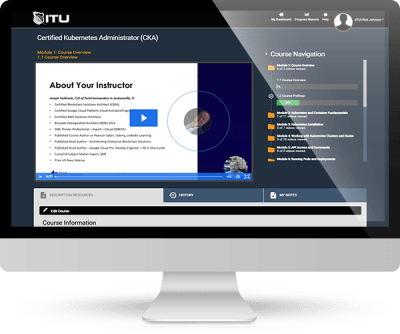Are you trying to find employment in IT with no prior knowledge? Though daunting, achieving a job in IT with no experience is attainable through skill development, trend recognition, certification acquisition, and portfolio building. With the right video IT courses and some dedication, you’ll have the skills and knowledge necessary for success. We’ll explore how developing your skills, understanding industry trends, gaining certifications, and building your portfolio are all important steps on this journey of how to get a job in IT with no experience.
Developing the Necessary Skills
Gaining the capacity to excel in an IT occupation necessitates commitment and effort. Technical skills, such as coding and programming, are essential to any IT professional. Learning these languages can be challenging at first but with practice and perseverance it’s possible to become proficient in them. Soft skills like communication, problem-solving, and creative thinking are also important components of an IT career. These can be honed through experience or by taking courses that focus on developing soft skills. Networking is another key factor when it comes to advancing your career in the tech world; making connections with other professionals can open up opportunities you wouldn’t have otherwise had access to. Maintaining a sharpened edge in the IT industry requires ongoing professional growth; staying aware of new developments and tech advancements is essential for keeping up with the rapid pace of change.
Developing the necessary skills is essential for those looking to break into IT with no experience. With a thorough understanding of both technical and soft skills, as well as networking and professional development strategies, one can be better prepared to understand the industry they are entering.
Communication Skills
When applying for an IT job with no experience, having strong communication skills can be a great asset. Knowing how to effectively communicate both verbally and in writing is essential for success in the IT field.
Verbal Communication: In IT, you will need to be able to clearly explain technical concepts to those who may not have a technical background. Being able to listen carefully, ask questions, and provide clear answers can be invaluable in this field.
Written Communication: Being able to write technical documents and reports is also an important skill for IT professionals. Knowing how to break down complex concepts into easy-to-understand language is essential for success.
Transferable Skills
Getting a job in IT with no experience can seem daunting. It may feel like you’re competing against experienced candidates in a tough job market, but it is possible. One way to get your foot in the door is to focus on transferable skills.
Transferable skills are those that can be used in various roles and industries, such as customer service, problem-solving, communication, and leadership. If you have any of these skills, be sure to highlight them in your resume and cover letter.
Relevant Skills
If you are looking to get a job in the IT field but have no experience, don’t despair. There are certain skills that employers will look for when hiring someone with no prior IT experience.
First, it is important to understand the basics of computers and information technology. This includes having a basic understanding of computer hardware, software, networks, and other related technologies. Having an understanding of coding languages such as HTML, CSS, and JavaScript can also be beneficial. Additionally, having an understanding of cybersecurity and database management can also be advantageous when applying for IT jobs.
College Degree
Having a college degree is one of the most important factors in getting your foot in the door for an IT job. Even if you have no prior work experience, having a college degree will demonstrate to employers that you have the skills and knowledge necessary to complete the job. A bachelor’s degree in computer science or a related field is usually preferred by employers, although some may accept an associate’s degree.
“Start your IT career today. Learn coding & programming, develop soft skills, network, and stay up to date with trends in the tech world. #ITCareer #NoExperienceRequired Click to Tweet
Understanding the Industry
Understanding the industry is essential for success in IT. To get ahead, it’s important to stay informed of current trends and technologies that are being used by employers. Exploring job openings can help you figure out which capabilities and qualifications are necessary to stand out in the industry. Staying abreast of developments and tech will enable you to be agile when alterations occur, providing you a benefit over other contenders.
Gaining knowledge from seasoned professionals can offer a priceless understanding of the accepted standards within the field, in addition to strategies for succeeding. Gaining access to the wealth of expertise held by experienced professionals enables individuals to gain a comprehensive understanding of IT topics, such as networking and coding languages, which may have been otherwise inaccessible. Additionally, having a mentor who has “been there before” can provide guidance throughout your career journey and offer advice on navigating challenging situations that come up along the way.
Having access to knowledgeable mentors can also help bridge any gaps between theory and practice when it comes time for certification exams or interviews with potential employers. Knowing what questions they might ask or what topics they could cover during an interview gives applicants an advantage over those who don’t have this kind of information at their disposal. As the saying goes, “knowledge is power”; taking advantage of these resources puts one step closer to success in IT.
Gaining familiarity with the sector can provide you with a more in-depth look into what roles are accessible and how to get ready for them effectively. With certifications, however, you can demonstrate your knowledge of specific technologies and give employers greater confidence in hiring you.
“Gain an edge in the IT industry by staying informed of current trends, researching job opportunities & learning from experienced professionals. #ITCareer #NoExperienceRequired Click to Tweet
Gaining Certifications
Gaining credentials is key for those hoping to move up in the IT field. With a wide range of certifications available, it can be difficult to identify which ones will be most beneficial. To make this process easier, video IT courses provide an overview of the various certifications and how they can help individuals progress in their careers.
Unlock Your IT Potential with a Free Trail to Our Learning Management System
Unlock the full potential of your IT career with ITU Online’s comprehensive online LIFETIME Training Library. Our expert-led courses will help you stay ahead of the curve in today’s fast-paced tech industry.

Once a certification has been identified, preparation for the exam is key. Video IT courses provide detailed information on what topics may be covered on exams as well as strategies for studying and taking tests effectively. Additionally, some courses offer practice tests so users can become familiar with the format and content of actual certification exams before taking them.
Staying abreast of certification requirements and fees is essential for staying competitive in the job market, as one’s skills must remain current to stay ahead. Video IT courses cover topics such as continuing education requirements, renewal fees, and other aspects related to keeping certifications active throughout one’s career. They also provide guidance on ways to use these credentials professionally such as displaying them on resumes or networking with peers who have similar qualifications.
Accumulating certifications is indispensable for cultivating a prosperous IT career, and can give employers proof that you have the necessary proficiencies for their job openings. It is imperative to comprehend how to construct a profile in order to stand out from the competition and display your aptitudes.
“Grow your #IT career with certifications. Get ahead of the competition by using video IT courses to study, prepare & maintain credentials. #CertifiedSuccess Click to Tweet
Building Your Portfolio
Building your portfolio is an essential part of the IT field. It’s like having a CV, but with much more detail and personality. Video IT courses can help individuals to develop their portfolio by showcasing their work experience and projects, creating an online presence, and leveraging social media platforms to promote themselves professionally.
Highlighting your talents and accomplishments, video courses provide an ideal platform to create a portfolio without needing coding knowledge – enabling you to showcase screenshots of code samples and videos discussing the projects. With video courses, it’s easy to create a portfolio that highlights your skills and experiences without needing any coding knowledge. You can upload videos of yourself talking about different projects you’ve worked on as well as screenshots of code samples from those same projects. This will give potential employers a good idea of what kind of developer or programmer you are before they even meet you.

Creating an Online Presence:
Having an online presence is key for anyone looking for jobs in the tech industry today. By having an online presence, employers can gain a better understanding of who you are and the value that you bring to their organization. With video courses, this process becomes even simpler since there are already tools available that allow users to build websites quickly and easily without any coding knowledge needed at all.
Leveraging Social Media Platforms:
Another way that video IT courses can help individuals build their portfolios is by leveraging social media platforms such as LinkedIn or Twitter. By using these sites effectively, job seekers can showcase their skillset while networking with other professionals in the industry – something which could prove invaluable when applying for jobs later down the line. Additionally, by regularly posting content related to technology topics (such as tutorials) users can demonstrate both their expertise in specific areas as well as staying up-to-date with current trends within the industry – another plus point when seeking employment opportunities.
To be successful in the IT field, it is important to have a comprehensive portfolio showcasing one’s expertise and accomplishments. Subsequent to building a portfolio, the next stage is taking on job applications.
Key Takeaway: Video IT courses are the key to success for individuals looking to get a job in tech with no experience. By creating an online presence and leveraging social media platforms, users can showcase their skillset while networking with other professionals – ultimately giving them the edge over competitors when applying for jobs down the line. With video courses providing tools that allow anyone to quickly build up their portfolio without needing any coding knowledge, it’s never been easier (or more fun.)to start building your career path in IT.
Applying for Jobs
Securing a position in IT can be an intimidating process. Creating a well-crafted resume and cover letter to stand out from the crowd, along with an understanding of where job openings can be found, is essential for success in securing IT positions. Video IT courses can provide invaluable assistance with these steps so you don’t get lost in the shuffle.
Crafting an Effective Resume and Cover Letter:
Writing a strong resume and cover letter is key when applying for any job, especially one in the technology industry. Video IT courses offer tips on how to craft your documents so they stand out from other applicants. You’ll learn about what employers are looking for and how best to present yourself on paper – skills that will serve you well throughout your career.
Finding Job Openings and Applying Online:
Knowing where to look for tech jobs is half the battle. With video, IT courses, you’ll gain insight into which websites are most helpful when it comes to finding open positions, including those not advertised publicly or through traditional channels like Indeed or Monster. This can give you an edge over other candidates who may be relying solely on those sites.
Following Up After Submitting Applications:
Following up after submitting applications is often overlooked by job seekers but it’s essential if you want to make sure your application doesn’t fall through the cracks. Video IT courses provide advice on how best to follow up without being too pushy or coming across as desperate – two things employers definitely don’t appreciate. They also teach techniques such as using social media platforms like LinkedIn strategically when reaching out – this could help set you apart from others vying for the same position(s).
Key Takeaway: Video IT courses can provide the perfect springboard for job seekers looking to land a gig in tech without any prior experience, teaching them how to craft an eye-catching resume and cover letter as well as where to look for jobs that might not be advertised publicly. Additionally, they’ll learn techniques on how best to follow up with employers after submitting applications – giving them the upper hand over their competition.
FAQs in Relation to How to Get a Job in it With No Experience
What is the easiest IT job to start with?
A network administrator is typically the easiest IT job to start with. Network administrators must possess the technical expertise to effectively manage, configure and troubleshoot networks of all sizes by utilizing a range of networking protocols, and technologies such as TCP/IP, DNS, DHCP, and Ethernet switches & routers while also having an understanding of security measures like firewalls and antivirus software. Network admins need to be acquainted with networking norms and technologies, like TCP/IP, DNS, DHCP, Ethernet switches, and routers. Additionally, they should be knowledgeable in areas such as security measures like firewalls and antivirus software. With these skills in hand network administrators can often find entry-level positions that offer on-the-job training which makes it easier to get started in the field without prior experience or certifications.
How do I start a career in IT?
To begin a successful career in IT, one should possess an aptitude for the fundamentals of computer science and software engineering as well as knowledge of various operating systems, networks, databases, programming languages, security protocols, and more. Being knowledgeable in different OSs, networks, databases, coding languages, safety measures and more is essential. One should also develop strong problem-solving skills as well as analytical thinking abilities. Additionally, having experience with hardware installation or system administration can help to make you stand out from other applicants. Finally, it is beneficial to pursue certifications such as CompTIA A+, Network+, or Security+. With dedication and hard work, anyone can start their journey into a successful career in IT.
How hard is IT to get an IT job?
Obtaining an IT role is not as challenging as it could be. Gaining the necessary qualifications, understanding and expertise in IT can enable any individual to land a role within this sector. Having certifications such as CompTIA A+, Network+ or Security+ will help demonstrate your skill set to employers. Furthermore, having practical exposure to related technologies and systems may be advantageous when seeking job openings. Finally, being able to communicate effectively with others and showing initiative are important qualities that many employers look for when hiring IT professionals.
Do you need the experience to get an IT job?
No, experience is not a requirement to get an IT job. Though not necessary, having some background in the IT field may demonstrate one’s proficiency and understanding of the area. Those with no prior experience should focus on learning the basics of programming languages, software development processes, network security protocols, and other relevant topics before applying for jobs. Additionally, employers may look favorably upon those who have taken courses or certifications related to their desired role. Having some familiarity with the technologies used by companies will also help applicants stand out from the competition.
Conclusion
Overall, getting a job in IT with no experience is possible. With the right combination of skill development, industry knowledge, and certifications as well as portfolio building you can demonstrate to employers that you are capable and qualified for an IT role. Investing in video courses can be a great way to kickstart your foray into the IT industry, with the right amount of commitment and perseverance.
Take the first step towards your IT career and enroll in an online course with ITUOnline. Learn the skills needed to succeed in today’s digital world, gain experience, and get hired for a job you love!
PS: If you’re a newcomer to the exciting world of IT and seeking a comprehensive overview, be sure to check out our post on Getting Started in IT.
























